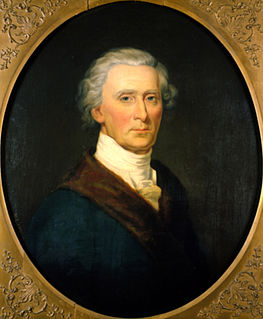A Quote by Max Stirner
Many a man renounces morals, but with great difficulty the conception, 'morality.' Morality is the 'idea' of morals, their intellectual power, their power over the conscience; on the other hand, morals are too material to rule the mind, and do not fetter an 'intellectual' man, a so-called independent, a 'freethinker.'
Related Quotes
I am a Christian according to my conscience in belief,in purpose and wish;Mnot of course by the orthodox standard. But I am content, and have a feeling of trust and safety.
The Machiavellian mind and the merchant mind are at one in their simple faith in the power of segmental division to rule all--in the dichotomy of power and morals and of money and morals.
Without morals a republic cannot subsist any length of time; they therefore who are decrying the Christian religion, whose morality is so sublime and pure (and) which insures to the good eternal happiness, are undermining the solid foundation of morals, the best security for the duration of free governments.
[F]or avoiding the extremes of despotism or anarchy . . . the only ground of hope must be on the morals of the people. I believe that religion is the only solid base of morals and that morals are the only possible support of free governments. [T]herefore education should teach the precepts of religion and the duties of man towards God.
We continually forget that the sphere of morals is the sphere of action, that speculation in regard to morality is but observation and must remain in the sphere of intellectual comment, that a situation does not really become moral until we are confronted with the question of what shall be done in a concrete case, and are obliged to act upon our theory.
At one time,' Golenishchev continued, either not observing or not willing to observe that both Anna and Vronsky wanted to speak, 'at one time a freethinker was a man who had been brought up in the conception of religion, law, and morality, who reached freethought only after conflict and difficulty. But now a new type of born freethinkers has appeared, who grow up without so much as hearing that there used to be laws of morality, or religion, that authorities existed. They grow up in ideas of negation in everything - in other words, utter savages.
Liberty, according to my metaphysics, is an intellectual quality, an attribute that belongs not to fate nor chance. Neither possesses it, neither is capable of it. There is nothing moral or immoral in the idea of it. The definition of it is a self-determining power in an intellectual agent. It implies thought and choice and power; it can elect between objects, indifferent in point of morality, neither morally good nor morally evil.
Many men without morals have attacked religion because it was contrary to their inclinations. Many wise men have despised it because it seemed to them ridiculous. Many persons have regarded it with indifference, because they have never felt its true disadvantages. But it is as a citizen that I attack it, because it seems to me harmful to the happiness of the state, hostile to the march of the mind of man, and contrary to sound morality, from which the interests of state policy can never be separated.







































